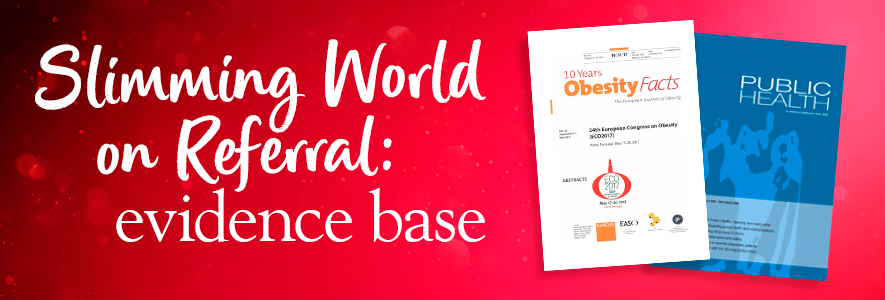
Slimming World on Referral is a subsidised partnership enabling health practitioners to refer patients to a local Slimming World group for weekly weight management support at no cost to the patient. Slimming World pioneered this NHS partnership programme with Greater and Central Derby Primary Care Trusts in 2001 and it is now an established obesity therapy in many NHS Trusts.
Latest publications
Toon, J., Bennett, SE., Lavin, J., Pallister, C., Avery, A. (2024) A service evaluation of more than 27,000 adults referred to a community weight management program: 24-month outcomes. Journal of Primary Care & Community Health. 15:1-12.
- This is the only service evaluation of a referral weight management programme, delivered in a real-life setting, that analyses and reports weight outcomes for more than 27,000 members with two-year outcomes.
- This publication consists of all referral members who first joined group via referral between January and December 2016 and follows their progress for 24 months through to December 2017.
- Participants came from 76 schemes across England and were referred for an initial 12-week period.
- There were 27,560 adults (15.6% males) with a mean age of 48.6 ± 14.8 years and mean baseline BMI of 37.1 ± 6.3 kg/m2 (91.7% >30 kg/m2, 64.6% 30–39.9 kg/m2 and 27.1% ≥40 kg/m2).
- Mean weight change was: -5.6% at three months, -7.1% at six months, -7.5% at 12 months and -7.3% at 24 months.
- 64.5% (n=17,765) continued to attend after their 12-week referral, and on average, attended a further 16.4 sessions.
- Of those, 29.2% (n=5191) were high attenders at 12 months (attending ≥41 sessions) and had a mean weight change of -15.3%.
- There were significant changes in all dietary and physical activity behaviours, including cooking from scratch more often; drinking fewer sugary drinks; eating fewer processed foods, takeaways, and fast foods; consuming fewer unhealthy snacks at work and at home; eating five portions of fruit and vegetables per day more frequently; doing more physical work around the house and garden; going for walks more often; playing sports and going to the gym more regularly; being less likely to avoid moderate and intense activity; and watching less television.
- Overall, the weight loss represents a return on the investment of referral to the 12-week programme.
- The data shows equal efficacy for adults referred with different levels of obesity, including those living with severe obesity, and for people from different socioeconomic backgrounds.
Toon, J., Geneva, M., Sharpe, P., Lavin, J., Bennett, SE., Avery, A. (2022). Weight loss outcomes achieved by adults accessing an online programme offered as part of Public Health England’s Better Health campaign. BMC Public Health. 22:1456
- This a service evaluation to determine whether adults accessing an online weight management programme via a national campaign are successful in losing weight.
- This publication consists of all adults registering with Slimming World’s online programme using a discounted membership offered as part of PHE’s ‘Better Health’ campaign between July and December 2020.
- There were 27,248 adults (5.3% males) with a mean age of 41.0 ± 11.4 years and mean baseline BMI of 33.4 ± 6.8 kg/m2 (29.2% 30–34.9 kg/m2, 18.3% 35–39.9 kg/m2 and 15.1%>40 kg/m2).
- Mean weight loss at 12 weeks was 2.7 (±3) kg, representing a mean loss of 3% (±3.1) body weight, with 42.3% achieving ≥ 3% and 22.1% weight loss ≥ 5%. An increased level of engagement leads to better weight losses.
- 30.9% of adults were in the lowest two IMD quintiles and absolute and percentage weight change did not differ across deprivation quintiles.
- 34.9% continued to access the online support after the offer period.
- This service evaluation shows that an online programme, offered as part of a national campaign, can offer effective support to a large number of people with different starting BMIs and from different socioeconomic backgrounds.
You can find a full list of publications in our research portfolio.